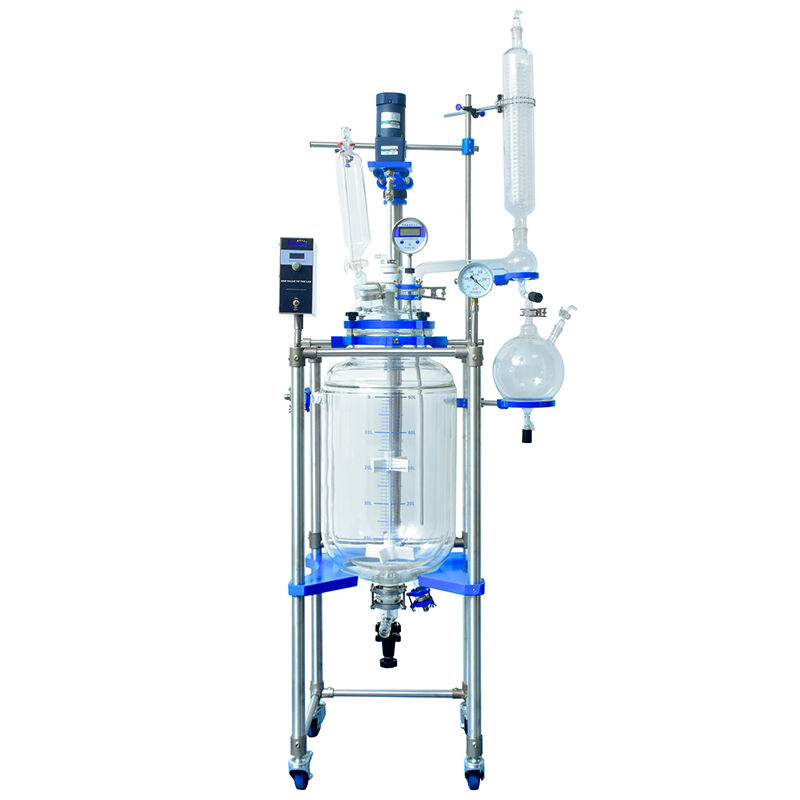Temperatuuri reguleerimine
Temperatuuri täpse reguleerimise tähtsus katsetes
Teil on täpne temperatuurikontroll vaja, et tagada edukad keemilised reaktsioonid. Temperatuur mõjutab reaktsioonikiirust ja toote moodustumist. Jacketed Glass Reaktorid pakub seda täpsust. Need võimaldavad teil hoida katsete jaoks vajalikku täpset temperatuuri. See kontroll aitab teil saavutada järjepidevaid ja usaldusväärseid tulemusi.
Temperatuuri reguleerimise mehhanismid kattega reaktorites
Kattega klaasreaktorites kasutatakse reaktsioonianumat ümbritsevat kesta. Läbi selle jope saate kütte- või jahutusvedelikke tsirkuleerida. See süsteem võimaldab teil temperatuuri kiiresti ja täpselt reguleerida. Saate säilitada soovitud tingimused kogu katse vältel. See mehhanism tagab, et teie reaktsioonid kulgevad plaanipäraselt.
Materiaalne ühilduvus
Klaasi kasutamise eelised keemilistes reaktsioonides
Klaas sobib suurepäraselt paljude kemikaalidega. See ei reageeri enamiku ainetega, mistõttu on see ideaalne keemiliste reaktsioonide jaoks. Saate kasutada kattega klaasreaktoreid, muretsemata soovimatute koostoimete pärast. See ühilduvus tagab, et teie tulemused jäävad puhtaks ja saastamata.
Vastupidavus keemilisele korrosioonile ja saastumisele
Kattega klaasreaktorid on keemilise korrosiooni suhtes vastupidavad. Klaas ei korrodeeru kergesti isegi tugevate kemikaalide korral. See vastupidavus kaitseb teie katseid saastumise eest. Võite usaldada, et teie reaktsioonid jäävad puhtaks ja täpseks. See funktsioon muudab need reaktorid teie labori jaoks usaldusväärseks valikuks.
Paljupärastus ja kohanemisvõime
Sobivus erinevateks keemilisteks protsessideks
Kattega klaasreaktorid sobivad paljude keemiliste protsessidega. Saate neid kasutada sünteesiks, destilleerimiseks ja kristalliseerimiseks. Nende disain mahutab erinevat tüüpi reaktsioone. See mitmekülgsus muudab need oluliseks tööriistaks igas laboris.
Kohandusvalikud konkreetsete laborivajaduste jaoks
Saate kohandada kattega klaasreaktoreid vastavalt oma konkreetsetele vajadustele. Neid on erineva suuruse ja konfiguratsiooniga. Saate valida funktsioone, mis vastavad teie labori nõuetele. See kohanemisvõime tagab, et teil on katsete jaoks õige varustus.
Eelised teiste reaktoritüüpide ees
Võrdlus roostevabast terasest reaktoritega
Temperatuuri reguleerimise võimaluste erinevused
Leiate, et mantliga klaasreaktorid pakuvad roostevabast terasest reaktoritega võrreldes paremat temperatuurikontrolli. Klaasmaterjal võimaldab täpsemat reguleerimist. Saate säilitada tundlike reaktsioonide jaoks vajalikke täpseid temperatuure. See täpsus tagab, et teie katsed annavad ühtseid tulemusi. Roostevabast terasest reaktorid on sageli hädas sellise täpsusega. Need ei pruugi pakkuda samal tasemel kontrolli, mis võib mõjutada teie katsete tulemusi.
Materjalide koostoime ja saastumise riskid
Kui kasutate kattega klaasreaktoreid, vähendate materjalide koosmõju ohtu. Klaas ei reageeri enamiku kemikaalidega. See omadus vähendab saastumise võimalust. Teie katsed jäävad puhtaks ja usaldusväärseks. Roostevaba teras võib aga teatud ainetega suhelda. Need koostoimed võivad põhjustada saastumist. Seda riski peate oma labori reaktori valimisel arvestama.
Võrdlus ühe seinaga reaktoritega
Soojusülekande ja energiatarbimise efektiivsus
Kattega klaasreaktorid paistavad silma soojusülekande efektiivsusega. Jope disain võimaldab ühtlaselt jaotada kütte- või jahutusvedelikke. Optimaalsed soojustingimused saavutate väiksema energiaga. Üheseinalistel reaktoritel see efektiivsus puudub. Sageli vajavad nad soovitud temperatuuri hoidmiseks rohkem energiat. See erinevus muudab kattega klaasreaktorid teie labori jaoks energiasäästlikumaks valikuks.
Ohutus ja usaldusväärsus eksotermiliste reaktsioonide käsitlemisel
Ohutus on eksotermiliste reaktsioonide puhul ülioluline. Kattega klaasreaktorid pakuvad kontrollitud keskkonda. Saate tõhusalt juhtida soojuse kogunemist. See kontroll vähendab õnnetuste ohtu. Üheseinalised reaktorid ei pruugi pakkuda sama ohutustaset. Nad võivad eksotermiliste protsesside ajal soojusjuhtimisega võidelda. Peaksite seadma esikohale ohutuse, valides selliste reaktsioonide jaoks mantliga klaasreaktorid.
Praktilised kaalutlused mantliga klaasreaktori valimisel
Nõuded suurusele ja mahule
Teie labori jaoks sobiva reaktori suuruse määramine
Kattega klaasreaktori jaoks õige suuruse valimine on ülioluline. Peate arvestama tüüpiliste reaktsioonide mahuga. Liiga väike reaktor ei pruugi teie vajadusi rahuldada, samas kui liiga suur reaktor võib olla ebaefektiivne. Hinnake oma katsete ulatust ja valige reaktor, mis vastab teie labori nõuetele. See tagab, et suudate oma katseid tõhusalt läbi viia.
Võimsuse tasakaalustamine ruumipiirangutega
Laborites on ruum sageli piiratud. Peate tasakaalustama reaktori võimsust olemasoleva ruumiga. Mõõtke oma laboriala ja kaaluge, kuidas reaktor teie olemasolevasse seadistusse sobib. Kui ruumi napib, võib osutuda vajalikuks kompaktne disain. Veenduge, et teie valitud reaktor ei koormaks teie tööruumi üle. See tasakaal aitab säilitada organiseeritud ja tõhusa laborikeskkonna.
Eelarve ja kulutõhusus
Esialgse investeeringu hindamine võrreldes pikaajalise kasuga
Kattega klaasreaktorisse investeerimine nõuab hoolikat rahalist kaalumist. Esialgu võib kulu tunduda kõrge. Siiski peaksite hindama pikaajalist kasu. Need reaktorid pakuvad täpset temperatuuri reguleerimist ja materjalide ühilduvust, mis võib viia edukamate katseteni. Aja jooksul võib nende pakutav täpsus ja usaldusväärsus esialgsed kulutused üles kaaluda. Arvestage kulude hindamisel paremate tulemuste ja jäätmete vähendamise potentsiaali.
Hooldus- ja kasutuskulud
Hooldus- ja tegevuskulud on teie otsuse tegemisel olulised tegurid. Regulaarne hooldus tagab teie reaktori optimaalse töö. Ootamatute rikete vältimiseks peaksite planeerima rutiinset hooldust. Lisaks võtke arvesse tegevuskulusid, näiteks energiatarbimist. Kattega klaasreaktorid on sageli energiatõhusad, mis võib vähendada jooksvaid kulusid. Neid kulusid planeerides tagate, et teie reaktor jääb teie laborile väärtuslikuks varaks.
Kattega klaasreaktorid pakuvad laboratoorsetes rakendustes olulisi eeliseid. Need tagavad täpse temperatuuri reguleerimise, tagades, et teie katsed annavad täpseid tulemusi. Nende klaaskonstruktsioon minimeerib saastumise riski, suurendades teie labori ohutust. Neid reaktoreid valides parandate katsetulemusi ja säilitate usaldusväärse uurimiskeskkonna. Kaaluge kattega klaasreaktorite integreerimist oma laborisse täpsuse ja töökindluse tagamiseks. Need on hindamatud tööriistad igale laborile, kes soovib oma uurimissuutlikkust tõsta.

